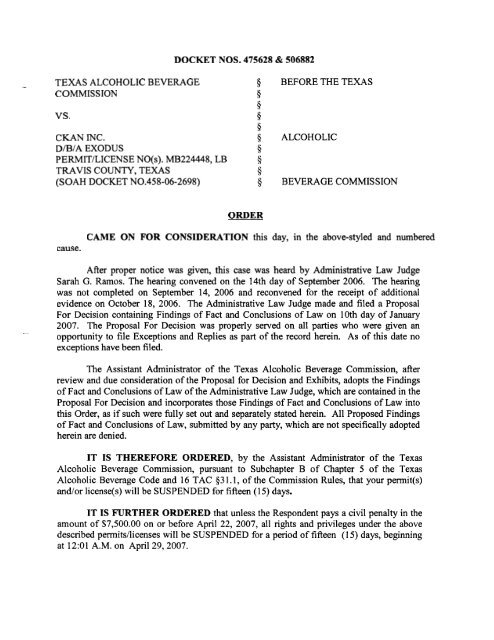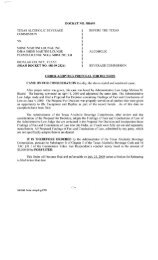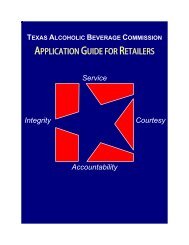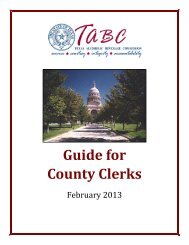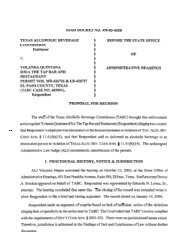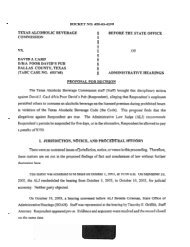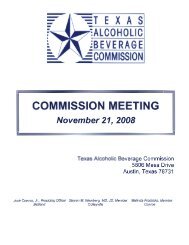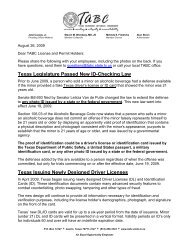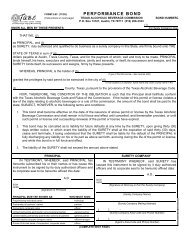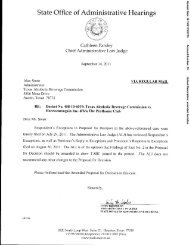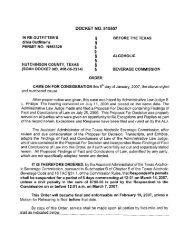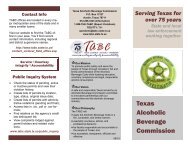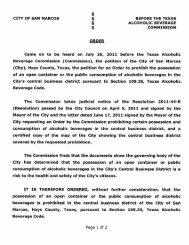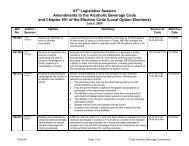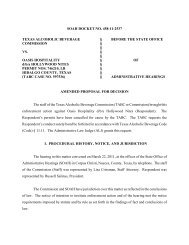DOCKET NOS. 475628 & 506882 TEXAS ALCOHOLIC BEVERAGE ...
DOCKET NOS. 475628 & 506882 TEXAS ALCOHOLIC BEVERAGE ...
DOCKET NOS. 475628 & 506882 TEXAS ALCOHOLIC BEVERAGE ...
You also want an ePaper? Increase the reach of your titles
YUMPU automatically turns print PDFs into web optimized ePapers that Google loves.
<strong>DOCKET</strong> <strong>NOS</strong>. <strong>475628</strong> & <strong>506882</strong><br />
- <strong>TEXAS</strong> <strong>ALCOHOLIC</strong> <strong>BEVERAGE</strong><br />
COMMISSION<br />
VS.<br />
CKAN MC.<br />
D/B/A EXODUS<br />
PERMITILICENSE NO(s). MB224448, LB<br />
TRAVIS COUNTY, <strong>TEXAS</strong><br />
(SOAH <strong>DOCKET</strong> N0.458-06-2698)<br />
$ BEFORE THE <strong>TEXAS</strong><br />
6<br />
6<br />
0<br />
0<br />
6 <strong>ALCOHOLIC</strong><br />
6<br />
6<br />
6<br />
$ <strong>BEVERAGE</strong> COMMISSION<br />
ORDER<br />
cause.<br />
CAME ON FOR CONSIDERATION this day, in the above-styled and numbered<br />
-<br />
After proper notice was given, this case was heard by Administrative Law Judge<br />
Sarah G. Ramos. The hearing convened on the 14th day of September 2006. The hearing<br />
was not completed on September 14, 2006 and reconvened for the receipt of additional<br />
evidence on October 18, 2006. The Administrative Law Judge made and filed a Proposal<br />
For Decision containing Findings of Fact and Conclusions of Law on 10th day of January<br />
2007. The Proposal For Decision was properly served on all parties who were given an<br />
opportunity to file Exceptions and Replies as part of the record herein. As of this date no<br />
exceptions have been filed.<br />
The Assistant Administrator of the Texas Alcoholic Beverage Commission, after<br />
review and due consideration of the Proposal for Decision and Exhibits, adopts the Findings<br />
of Fact and Conclusions of Law of the Administrative Law Judge, which are contained in the<br />
Proposal For Decision and incorporates those Findings of Fact and Conclusions of Law into<br />
this Order, as if such were fully set out and separately stated herein. All Proposed Findings<br />
of Fact and Conclusions of Law, submitted by any party, which are not specifically adopted<br />
herein are denied.<br />
IT IS THEREFORE ORDERED, by the Assistant Administrator of the Texas<br />
Alcoholic Beverage Commission, pursuant to Subchapter B of Chapter 5 of the Texas<br />
Alcoholic Beverage Code and 16 TAC 93 1.1, of the Commission Rules, that your permit(s)<br />
and/or license(s) will be SUSPENDED for fifteen (1 5) days.<br />
IT IS FURTHER ORDERED that unless the Respondent pays a civil penalty in the<br />
amount of $7,500.00 on or before April 22, 2007, all rights and privileges under the above<br />
described permits/licenses will be SUSPENDED for a period of fifteen (1 5) days, beginning<br />
at 12:Ol A.M. on April 29,2007.
This Order will become final and enforceable on<br />
9<br />
2007, unless a Motion for Rehearing is filed before that date. U<br />
By copy of this Order, service shall be made upon all parties by in the manner<br />
indicated below.<br />
On Behalf of the Administrator,<br />
~ e a wFox, e Assistant ~dmidtrat6r<br />
Texas Alcoholic Beverage Commission<br />
The Honorable Sarah G. Rarnos<br />
Administrative Law Judge<br />
State Office of Administrative Hearings<br />
VIA FAX (5 12) 475-4994<br />
-<br />
Don Edward Walden<br />
ATTORNEY FOR RESPONDENT<br />
7200 North Mopac, Suite 300<br />
Austin, TX 7873 1<br />
VIA FAX (5 12) 795-8079<br />
CKAN INC.<br />
RESPONDENT<br />
d/b/a EXODUS<br />
53 19 Presidio Rd<br />
Austin, TX 78745<br />
W. Michael Cady<br />
ATTORNEY FOR PETITIONER<br />
TABC Legal Section<br />
Licensing Division<br />
Enforcement Division
State Office of Administrative Hearings<br />
Shelia Bailey Taylor<br />
Chief Administrative Law Judge<br />
January 10,2007<br />
Alan Steen<br />
Administrator<br />
Texas Alcoholic Beverage Commission<br />
5806 Mesa Drive<br />
Austin, Texas 78731<br />
HAND DELIVERY<br />
RE: Docket No. 458-06-2698; Texas Alcoholic Beverage Commission v CKAN, INC.<br />
d/b/a Exodus Permit Nos. MB224448 and 2244499 Travis County, Texas<br />
Dear Mr. Steen:<br />
Please find enclosed a Proposal for Decision in this case. It contains my recommendation<br />
- and underlying rationale.<br />
Exceptions and replies may be filed by any party in accordance with 1 TEX. ADMIN.<br />
CODE 5 155.59(c), a SOAH rule which may be found at www.soah.state.tx.us.<br />
Sincerely,<br />
Sarah G. Ramos<br />
Administrative Law Judge<br />
Enclosure<br />
xc:<br />
Docket Clerk, State Office of Administrative Hearings- VIA HAND DELIVERY<br />
Michael E. Cady, Staff Attorney, Texas Alcoholic Beverage Commission, 5806 Mesa Drive, Austin, TX 78731-<br />
VIA HAND DELXVERY<br />
Lou Bright, Director of Legal Services, Texas Alcoholic Beverage Commission, 5806 Mesa Drive, Austin, TX 7873 1 -<br />
VIA HAND DELIVERY<br />
Don Walden, Attorney at Law, Law Office of Don Walden, 7200 N. Mopac, Suite 300, Austin, TX 78731 -m<br />
REGULAR MAIL<br />
JAN 1 0 2007<br />
--<br />
I --<br />
Post Office Box 13025 + 300 West 15th Street, Suite 502 + Auatin Texas 78711-3025<br />
(512) 4754993 Docket (512) 475-3445 Fax (512) 475-4994
SOAH <strong>DOCKET</strong> NO. 458-06-2698<br />
<strong>TEXAS</strong> <strong>ALCOHOLIC</strong> <strong>BEVERAGE</strong><br />
COMMISSION,<br />
Petitioner<br />
v.<br />
CKAN, INC.<br />
D/B/A EXODUS<br />
PERMIT <strong>NOS</strong>. MB224448 and 2244499<br />
TRAVIS COUNTY, <strong>TEXAS</strong><br />
Respondent<br />
9 BEFORE THE STATE OFFICE<br />
§<br />
§<br />
§<br />
0 OF<br />
§<br />
§<br />
§<br />
9 ADMINISTRATIVE HEARINGS<br />
PROPOSAL FOR DECISION<br />
The Staff of the Texas Alcoholic Beverage Commission (TABC or Commission) brought this<br />
disciplinary action against CKAN, Inc. d/b/aExodus (Respondent) alleging that one ofRespondent's<br />
employees was intoxicated on the premises and another employee served alcoholic beverages to<br />
- intoxicated persons, and with criminal negligence, to a minor. The evidence proved only the<br />
allegation regarding sale of alcoholic beverages to intoxicated persons. For this violation, the<br />
Administrative Law Judge (ALJ) recommends a fifteen-day suspension, or in lieu of suspension,<br />
payment of a $7,500 penalty.<br />
I. JURISDICTION, NOTICE, AND PROCEDURAL HISTORY<br />
Commission staff attorney Michael E. Cady represented the Staff, and attorney<br />
Don E. Walden represented the Respondent. Neither party challenged notice or jurisdiction, and<br />
those matters are addressed only in the Findings of Fact and Conclusions of Law. The.hearing was<br />
convened by ALJ Sarah G. Ramos at the State Office of Administrative Hearings, 300 W.<br />
Fifteenth Street, Austin, Texas, on September 14,2006. Because the hearing was not completed<br />
that day, it was reconvened for the receipt of additional evidence on October 18,2006. The record<br />
closed on November 13, 2006, after the parties had an opportunity to file written closing<br />
arguments.
SOAH <strong>DOCKET</strong> NO. 458-06-2698 PROPOSAL FOR DECISION PAGE 2<br />
Respondent holds Mixed Beverage Permit MI3224448 and Mixed Beverage Late Hours<br />
Permit BN224449 for the premises located at 302-04 E. 6' Street, Austin, Texas, at which the club<br />
Exodus is operated.<br />
11. INTOXICATED EMPLOYEE ALLEGATION<br />
A. Evidence<br />
1. Judson Chapman<br />
-<br />
Austin Police Department (APD) Officer Chapman was on duty in Austin's Sixth Street<br />
area on May 21,2005. As he was walked through an alley behind Sixth Street, he came across<br />
a man, later identified as David Lee White, who was sitting in an alcove at the back door of the<br />
Exodus premises. The door is not marked with the business's name, is not a public-access door,<br />
and is closed at most times, Officer Chapman stated.<br />
Officer Chapman spoke with Mr. White to determine whether Mr. White was sick or<br />
intoxicated because he had vomited on the front of his shirt. Mr. White, who had a towel hanging<br />
out of his back pocket, told the officer that he was a bouncer at the club.<br />
Officer Chapman then called for TABC agents, and when they arrived, they took over the<br />
investigation. Officer Chapman said he had no reason to believe Mr. White was lying and was not<br />
a bouncer at Exodus. When Officer Chapman has worked undercover as a bouncer, he has kept<br />
a towel in his back pocket because most bouncers have a such a towel when they are on duty.
SOAH <strong>DOCKET</strong> NO. 458-06-2698 PROPOSAL FOR DECISION PAGE 3<br />
2. TABC Agent Tricia Rntledge<br />
Agent Rutledge, a certified peace officer, also was working in Austin's Sixth Street area<br />
on May 21,2005. She responded to Officer Chapman's call for a TABC agent and went to the<br />
back of Respondent's premises.<br />
Agent Rutledge said she works on Sixth Street about once a week, and except for club<br />
employees, she does not see people carrying towels in their back pockets. And, although Agent<br />
Rutledge saw vomit was on front of Mr. White's shirt, she did not see any on the towel in his<br />
pocket.<br />
-<br />
Mr. White told Agent Rutledge that a was a bouncer at Exodus and began work at 9:00 p.m.<br />
However, he said, because of his intoxicated state, a manager had put him in the alcove and called<br />
someone to come and get him. He also told her he had had four beers and three shots that evening.<br />
Because Mr. White appeared to be intoxicated, Agent Rutledge performed a horizontal gaze<br />
nystagmus test on him, during which he had difficulty standing.<br />
Agent Rutledge placed Mr. White under arrest, and then went inside Respondent's premises<br />
where she met with Respondent's manager on duty that evening, Sarni Derder. When Agent<br />
Rutledge approached him about the violation of having an intoxicated employee on the premises,<br />
Mr. Derder did not deny that Mr. White was an employee.<br />
Agent Rutledge then trahsported Mr. White to the jail. Mr. White began vomiting at Eighth<br />
Street and Congress Avenue, and he did not stop until they arrived at the jail entrance.
SOAH <strong>DOCKET</strong> NO. 458-06-2698 PROPOSAL FOR DECISION PAGE 4<br />
3. TABC Agent Johnny King<br />
Another TABC agent working in the area, Agent King, also went to the back ofRespondent's<br />
premises in response to Officer Chapman's call. Agent Rutledge asked Agent King to go inside<br />
Exodus and issue an administrative notice to the person in charge of the premises that evening. He<br />
left the notice with Mr. Derder, who told Agent King that he was the person in charge. Mr. Derder<br />
told Agent King that he had called "that man's girlfriend" to come get him.<br />
Like Agent Rutledge, Agent King said he routinely works on Sixth Street and has not seen<br />
numbers of people with towels in their back pockets. When he was in El Paso, he did see seen bar<br />
patrons with towels; they had the towels because some ofthe clubs were not air-conditioned, he said.<br />
4. Sami Derder<br />
The manager on duty at Respondent's premises on May 21,2005, Mr. Derder has worked<br />
for Exodus's owner, Akrarn Nasreddine, for about ten years. Mr. Derder is responsible for the dayto-day<br />
operations at Exodus and is on duty six nights a week. Mr. Derder said persons who do not<br />
work in clubs sometimes carry towels in their back pockets.<br />
According to Mr. Derder, Mr. White did remodeling and painting work at the club and<br />
completed the work a couple of days before May 21,2005. Mr. Derder paid him at 8:30 or 9:00 p.m.<br />
that evening. Mr. White performed no other services for Exodus, Mr. Derder testified.<br />
After Mr. White was paid, he left, but Mr. Derder saw him later when the employees<br />
monitoring the door entry told him Mr. White was outside the fiont door. Mr. Derder went out on<br />
sidewalk to talk with him, and Mr. White asked Mr. Derder to call his girlfriend to pick him up.<br />
Mr. White said he would wait in the back for her. Mr. Derder said then guided Mr. White to the
SOAH <strong>DOCKET</strong> NO. 458-06-2698 PROPOSAL FOR DECISION PAGE 5<br />
- .~<br />
back alcove. The back door opens into the alley and was closed at the time because patrons are not<br />
allowed to entqor leave through that door. Employees use it to take out trash.<br />
Through Mr. Derder, Exodus's payroll records were introduced into evidence. The record<br />
for May 20,2005, lists eight employees and does not include Mr. White. Mr. Derder said he paid<br />
Mr. White in cash, but he did not have a cash receipt to support that testimony.<br />
5. Ayoub Saad<br />
Mr. Saad, the bar manager for Exodus, worked &om 9:00 p.m. until 2:00 or 3:00 a.m. during<br />
the month of May 2005. Mr. Saad said Mr. White did some cleaning and painting at the club but<br />
was not an employee. Mr. White came into Exodus about 8:30 p.m. on May 21, 2005, to get his<br />
money for the painting work he had done earlier in the week; he took his money and left, Mr. Saad<br />
recalled. He added that Mr. White had no business being at Exodus during club hours.<br />
6. Akram Nasreddine<br />
Sole owner and president of CKAN, Inc., the corporation that holds the TABC permits,<br />
Mr. Nasreddine, was introduced to Mr. White by one of his employee at another business he owns,<br />
Austin Express Towing. The employee asked Mr. Nasreddine to give Mr. White a chance to be<br />
a wrecker driver. After Mr. White had trained for two days to be a driver, he then had to wait for<br />
approval from the APD. According to Mr. Nasreddine, Mr. White begged for some other work<br />
because he was completely out of money.<br />
Mr. Nasreddine told Mr. Derder to allow Mr. White to do some painting and remodeling<br />
at Exodus. Mr. White worked as an independent contractor at Exodus and was never an employee<br />
or on the payroll. Contractors are paid separately in cash, he added. Mr. Nasreddine said he has<br />
never allowed an employee to be on duty while intoxicated.
SOAH <strong>DOCKET</strong> NO. 458-06-2698 PROPOSAL FOR DECISION PAGE 6<br />
Mr. Nasreddine also testified that the back door at Exodus is a fire exit, and it pushes open<br />
from the inside. The employees use it sometimes to take trash out or bring boxes in.<br />
Mr. Nasreddine said he was introduced to Jennifer Worthington, another witness at the<br />
hearing, by a doorman who used to work for him. When she testified, Ms. Worthington worked<br />
at Mr. Nasreddine's towing company, but she did not work there on May 21,2005.<br />
7. Jennifer Worthington<br />
Ms. Worthington testified that she was in a group of four people who went out socially on<br />
May 21,2005. Mr. White, a fiiend of someone she knew, began the evening with the group.<br />
According to Ms. Worthington, Mr. White said nothing about going to work that evening.<br />
The first place the group went on Sixth Street was Paradox, and they arrived there about<br />
9 p.m. Mr. White could not get into Paradox because of his attire; 6e was wearing jeans, a black<br />
shirt, and tennis shoes. The others went inside Paradox, and Mr. White said he would find them<br />
later in the evening. Ms. Worthington next saw him outside of the Dizzy Rooster between 11:OO<br />
p.m. and midnight and, during the hearing, recalled that he had been singing and dancing to a song<br />
that was playing inside the Dizzy Rooster. Mr. White told the group that he had visited quite a few<br />
places downtown. In Ms. Worthington's opinion, Mr. White was intoxicated at that time. She<br />
also added that he had the towel because he had vomited on himself. As they talked, Mr. White,<br />
began acting belligerent. He sat down and said he was thinking about getting another drink. She<br />
did not see him again that evening.
SOAH <strong>DOCKET</strong> NO. 458-06-2698 PROPOSAL FOR DECISION PAGE 7<br />
B. Arguments<br />
1. Staff<br />
Staff noted Mr. White's statement that he was a bouncer at Exodus who went on duty at<br />
9:00 p.m. In addition, Staff relied on law enforcement officer's testimony about Mr. Derder's<br />
failure to deny that Mr. White was employed there. There was no reason Mr. White would have<br />
had a towel in his back pocket if he had not been employed as a bouncer, Staff also argued.<br />
Further, Staff raised the question of why, if Mr. White had completed his work earlier in the week,<br />
Respondent would have required him to wait to be paid until a weekend evening. Staff also<br />
characterized Ms. Worthington's testimony as suspect because she is Mr. Nasreddine 's employee.<br />
Relying on this evidence, Staff requested that Respondent's permits be suspended for ten days<br />
with the option to pay $1 50 per day in lieu of suspension.<br />
2. Respondent<br />
Respondent argued that Staff failed to meet its burden of proving Mr. White was an<br />
employee on May 2 1, 2005, or that he performed any duty of employment on that day. As<br />
demonstrated by Ms. Worthington's testimony, Mr. White went with others to Sixth Street for a<br />
social evening. Even if Mr. White had been Respondent's employee, he was not working when<br />
law enforcement officials discovered him behind Respondent's premises, Respondent contended.<br />
C. Analysis<br />
Staff alleged a violation of Texas Alcoholic Beverage Code (Code) 5 11.61(13), which<br />
authorizes the Commission or Administrator to cancel a permit or suspend it for not more than<br />
60 days if the permittee was intoxicated on the licensed premises. The ALJ finds the Staff failed<br />
to meet its burden of proof on this issue. No Staff witness saw Mr. White working that evening<br />
or inside the premises. Even if Mr. White's statement is accepted as true and he was a bouncer
-<br />
SOAH <strong>DOCKET</strong> NO. 458-06-2698 PROPOSAL FOR DECISION PAGE 8<br />
at Exodus, he obviously had been relieved of duty and escorted to the back of the premises, away<br />
from any patrons, when Officer Chapman found him. Thus, the evidence does not establish that<br />
Mr. White was employed by Exodus while he was intoxicated.<br />
111. ALLEGATIONS REGARDING SERVING ALCOHOL TO INTOXICATED<br />
PERSONS AND A MINOR<br />
A. Evidence<br />
1. Tamara Joseph<br />
APD Detective Tamara Joseph was working undercover on Sixth Street on<br />
September 11, 2005. Around midnight, she and another officer went into Exodus to observe<br />
patrons to determine whether minors or intoxicated persons were being sold alcoholic beverages.<br />
-<br />
A young man wearing white shirt drew her attention. Later identified as James Allen<br />
Bigon, he had slurred speech, poor balance, and bloodshot, watery eyes. His mouth was hanging<br />
open, and drool came out as he watched those who were dancing. At first, Mr. Bigon was standing<br />
by himself, and then another man, later identified as Jesse Seavolt, came to stand with him.<br />
Together, they went to bar and talked to bartender. The second man also had slurred speech.<br />
Detective Joseph saw the men tilt their heads back to drink a shot and then walk away from<br />
bar with beers. When they ordered the drinks, their faces were eight-to-ten inches away from the<br />
bartender's, so Detective Joseph assumed the bartender could smell their breath. Officers later<br />
learned that Lindsay Mason was the bartender who served the two men.<br />
2. Agent Gregory Lewis<br />
Agent Lewis, a TABC enforcement agent and certified peace officer since 1998, was on duty<br />
September 10-1 1,2005, and was working undercover with Detective Joseph. He noticed the same
SOAH <strong>DOCKET</strong> NO. 458-06-2698 PROPOSAL FOR DECISION PAGE 9<br />
two men that Detective Joseph did and saw them order shots that included Vodka. The men<br />
"downed" the shots, took two beers away from the bar with them, and staggered to table where they<br />
conversed with others. When the two men ordered the drinks, the bartender was only eight-to-ten<br />
inches fiom them.<br />
Agent Lewis said the men had slurred speech; they were dropping letters and running words<br />
together. One man had moisture dribbling down side of his mouth as he watched the dance floor,<br />
and his hand movements were not smooth. They both had bloodshot, glassy eyes and unsteady<br />
movements and balance, like children who are learning to walk. According to Agent Lewis, both<br />
seemed equally impaired.<br />
To Agent Lewis, the younger man did not appear to be to be an minor. But, he later learned<br />
that the man was a minor and had used fake identification to enter Exodus.<br />
3. Agent King<br />
Agent King checked the drivers' licenses of both men who were suspected of being<br />
intoxicated. One of them had fake identification, but his actual driver's license showed he 'was born<br />
December 23,1996, and was twenty years old that evening.<br />
Agent King performed field sobriety tests on the men. They both had bloodshot eyes and<br />
slurred speech. After they failed field sobriety tests,' Agent King took the men into custody for<br />
public intoxication.<br />
' Mr. Bigon, in both eyes, lacked smooth pursuit, had distinct nystagmus at maximum deviation, and had<br />
nystagmus onset prior to 45 degrees; on the walk and turn test, lost balance during instructions, and started too soon,<br />
stopped while walking, and did not touch heel to toe; and on the one-leg stand, swayed while standing and put his foot<br />
down. Mr. Seavolt, in both eyes, lacked smooth pursuit, had distinct nystagmus at maximum deviation, and had<br />
nystagrnus onset prior to 45 degrees; on the walk and turn test, lost balance during instructions, stepped offline, and used<br />
his arms for balance; and on the one-leg stand, swayed while balancing and used his arms for balance.
SOAH <strong>DOCKET</strong> NO. 458-06-2698 PROPOSAL FOR DECISION PAGE 10<br />
4. Mr. Nasreddine<br />
Persons entering Exodus are given a wrist band if they are over 21, and their hands are<br />
stamped, Mr. Nasreddine testified. Servers are instructed not to sell alcohol to patrons who do not<br />
have a band and a stamp. Mr. Nasreddine said he requires every employee to attended TABC<br />
seller-server certification training. He has terminated about five employees who violated the rules<br />
against selling alcohol to minors or intoxicated persons. He said he did not fire Ms. Mason after this<br />
incident because her criminal case was dismissed, and she was not guilty.<br />
5. Mr. Derder<br />
Mr. Derder said he or another supervisor at Exodus meets with employees every two weeks<br />
and reminds employees not to sell alcohol to minors or intoxicated persons. Employees who violate<br />
the rules lose their jobs. The bouncers are specially trained to check identification and to ask for a<br />
second form of identification if what is presented looks suspect.<br />
When Exodus is open for business, Mr. Derder walks through the club every ten to fifteen<br />
minutes to make sure everything is all right. He stations an employee in a corner to be sure the<br />
bartender is not selling to minors.<br />
Mr. Derder testified that in September 2005, at least two employees on the payroll,<br />
Ronald Bethel and Christopher Williams, were not certified. In addition, he could not recall whether<br />
he was certified on the day the two men were arrested for public intoxication.<br />
6. Pertinent Exhibits<br />
Exhibit 9, the rules Exodus employees are required to sign and follow, prohibit serving<br />
intoxicated persons and minors. The rules require all employees to "look for underage drinkers<br />
throughout the night" and to remove alcoholic beverages from a minor and ask him or her to leave
SOAH <strong>DOCKET</strong> NO. 458-06-2698 PROPOSAL FOR DECISION PAGE 11<br />
the club. They require each bartender to pass and show proof that they have completed TABC's<br />
certification training. Bartenders are instructed not to serve any kind of alcoholic beverage to<br />
intoxicated persons and to ask the manager to get a taxi for them. If a person appears to be<br />
underage, the bartender must ask to see the wrist band and a valid Texas driver's license or<br />
identification card, and without these items, the person may not be served. Further, the rules state<br />
that a bartender who serves a minor will be fired.<br />
Seller-server certificates for three employees were introduced into evidence as part of<br />
Exhibit 1 1. They showed that on September 1 1,2005, Caitlin Blagrave, Jacqueline Sander, and<br />
Lindsay Mason, the bartender who served the two men, were seller-server certified.<br />
7. Respondent's Prior Violations<br />
-<br />
As reflected in Respondent's licensing records, Mr. Nasreddine stipulated on<br />
November 7,2003, that he intentionally, knowingly, and recklessly made a false statement and<br />
false representations in his personal history sheet filed with the Commission by failing to disclose<br />
he had been arrested in 1994 and 1995. Based on the stipulations, the TABC's action against him<br />
was dismissed without prejudice. In 1995 and 2000, actions were initiated against Respondent<br />
based on sales to minors or intoxicated persons. However, those actions were dismissed because<br />
the employees involved were seller-server certified, and there was insufficient evidence to indicate<br />
that Respondent directly or indirectly encouraged the sales.2<br />
Ex. 2.
SOAH <strong>DOCKET</strong> NO. 458-06-2698 PROPOSAL FOR DECISION PAGE 12<br />
B. Arguments<br />
1. Respondent<br />
Relying on Ms. Mason's certification, Respondent argued that her actions cannot be<br />
attributed to the permittee unless Respondent encouraged her to violate the law. Further, even law<br />
enforcement officers did not think Mr. Bignon was a minor until he was arrested and his actual<br />
driver's license was located. Thus, Respondent argued, the employee did not act with criminal<br />
negligence when she served the minor.<br />
2. Staff<br />
-.<br />
If Respondent's employees had adequately checked identification, Mr. Bignon's false<br />
identification would have been discovered, Staff argued. As for the offense of serving intoxicated<br />
persons, Respondent cannot rely on the safe harbor defense afforded by Code 5 106.14 because<br />
Mr. Derder, Mr. Nasreddine, and the persons who checked identification at the door were not<br />
seller-server certified.<br />
Staff requested a 30-day suspension with no option to pay a civil penalty in lieu of<br />
suspension based on Respondent's sale of alcohol to intoxicated persons. Staff asked that several<br />
factors be considered as aggravating circumstances, including: serving two persons who were<br />
intoxicated; the bartender's close access to the men; the failure to identify the minor's invalid<br />
driver's license; the failure of other employees to notice the intoxicated men and ask them to leave;<br />
two prior allegations of serving alcohol to minors and Respondent's reliance on safe harbor<br />
defenses in those cases; and the public intoxication of the two men, which indicated they were a<br />
danger to themselves and others.
SOAH <strong>DOCKET</strong> NO. 458-06-2698 PROPOSAL FOR DECISION PAGE 13<br />
C. Analysis<br />
Staff alleged that Respondent's, employee, with criminal negligence, served alcohol to a<br />
minor. A person acts with criminal negligence, or is criminally negligent:<br />
with respect to circumstances surrounding his conduct or the result of his conduct<br />
when he ought to be aware of a substantial and unjustifiable risk that the<br />
circumstances exist or the result will occur. The risk must be of such a nature and<br />
degree that the failure to perceive it constitutes a gross deviation from the standard<br />
of care that an ordinary person would exercise under all the circumstances as<br />
viewed from the actor's ~tandpoint.~<br />
Because Mr. Bignon presented false identification and did not appear to be underage, the<br />
ALJ agrees with Respondent and finds that Staff did not sustain its burden of proving Ms. Mason,<br />
with criminal negligence, served a minor. The evidence did not support a conclusion that she<br />
should have been aware of a substantial and unjustifiable risk that Mr. Bignon was underage.<br />
On the other hand, the evidence supports Staffs allegation that Respondent's employee<br />
served intoxicated persons. Based onDetective Joseph's and Agent Lewis's description ofthe two<br />
men and their proximity to Ms. Mason, it is clear that she should have recognized that the men<br />
were intoxicated. Even though the law enforcement officers were further away from the men than<br />
Ms. Mason was, they could hear slurred speech, see staggering walks, and see the drool on<br />
Mr. Bignon's face. Ms. Mason was as close as eight-to-ten inches from them and should have<br />
recognized their condition.<br />
Respondent relies on Code 5 106.14(a) for its affirmative defense. That section provides<br />
that the employee's actions are not attributable to the employer if:<br />
Code § 1.08 and TEX. PEN. CODE ANN. 66.03 (d).
SOAH <strong>DOCKET</strong> NO. 458-06-2698 PROPOSAL FOR DECISION PAGE 14<br />
(1) the employer requires its employees to attend a commissionapproved<br />
seller training program;<br />
(2) th employee has actually attended such a training program; and<br />
(3) the employer has not directly or indirectly encouraged the employee<br />
to violate such. law.<br />
By rule, TABC has defined as prima facie evidence of indirect encouragement, within the<br />
meaning of Code §106.14(a)(3), the permittee's failure to insure that all employees possess<br />
currently valid seller-server certificate^.^ Another rule defines "employee" as one who sells,<br />
serves, dispenses or delivers alcoholic beverages under the authority of a license or permit,<br />
including persons who immediately manage, direct, supervise, or control the sale or service of<br />
alcoholic beverages.'<br />
-<br />
Pursuant to these rules, Respondent's violation cannot be excused based on the safe harbor<br />
provision. Although Respondent testified that all employees must be seller-server trained,<br />
certificates for only three out of eight employees were offered into evidence, and there was no<br />
evidence that Mr. Derder was seller-server trained. Mr. Derder immediately managed, directed,<br />
supervised, and controlled the sale or service alcohol at Exodus. He oversaw day-to-day<br />
operations, conducted staff meetings where employees were trained, paid persons who worked as<br />
independent contractors, and took care of unusual situations, such as Mr. White's presence when<br />
he was intoxicated. Clearly, Mr. Derder was responsible for supervising the sale of alcohol at<br />
Respondent's premises, and he was not seller-server certified. In addition, some of the other<br />
employees were not certified, including the bar manager, Mr. Saad. As a result, the ALJ finds that<br />
Respondent served an alcoholic beverage to intoxicated persons, in violation of Code<br />
16 TAC § 50.2 (4). The definition excludes the permittee's officers who do not manage, direct, supervise<br />
or control the sale or service of alcoholic beverages.
~ -<br />
SOAH DOCI(ET NO. 458-06-2698 PROPOSAL FOR DECISION PAGE 15<br />
8 1 1.61 (b)(14). For this violation, the Commission or Administrator may suspend a permit for not<br />
more than 60 days or to cancel it.6<br />
The Commission has adopted a Standard Penalty Chart at 16 TEX. ADM~N. CODE (TAC)<br />
37.60(a) (West 2005). The chart includes suggested sanctions for the Commission's agents,<br />
compliance officers, or other designated personnel to use when settling cases prior to a hearing.<br />
The suggested sanctions bind neither an ALJ nor the Commission and deviations from the chart<br />
are permitted if there are aggravating or mitigating circumstances. For the first violation of the<br />
sale of an alcoholic beverage to an intoxicated person, the suggested penalty is a ten-to-fifteen day<br />
suspension.<br />
Even though the Standard Penalty chart is not binding, it does provide some guidance in<br />
considering a penalty. The ALJ disagrees with Staff that actions which were initiated but<br />
dismissed should provide any basis upon which to enhance a sanction. As for Mr. Nasreddine's<br />
stipulations that he lied on his application, no action was taken in regard to that action. Thus, the<br />
ALJ also does not consider it an appropriate basis upon which to enhance a penalty. Further, as<br />
previously stated, Respondent is not accountable for the action involving the minor. Yet, the fact<br />
remains that Ms. Mason served two intoxicated persons, and Respondent's employees responsible<br />
for monitoring patrons either did not observe the men or failed to take action as they demonstrated<br />
obvious signs of intoxication. Accordingly, the ALJ recommends the highest level penalty for a<br />
first violation as suggested by the chart, fifteen days.<br />
For this type of violation, the Commission may, but is not requirecl to, allow the permittee<br />
the opportunity to pay a civil penalty in lieu of suspension. The civil penalty may not be less than<br />
$1 50 or more than $25,000 for each day the permit or license was to have been suspended.7 The<br />
amount of the civil penalty must be appropriate for the nature and seriousness of the violation when<br />
- -<br />
Code 4 11.61(b).<br />
Code 4 1 1.64.
SOAH <strong>DOCKET</strong> NO. 458-06-2698 PROPOSAL FOR DECISION PAGE 16<br />
considering: (1) the type of license or permit held; (2) the type of violation; (3) any aggravating or<br />
ameliorating circumstances concerning the violation, including those enumerated in Code 4 11.64(c);<br />
and (4) the permittee's or licensee's previous violations.' The aggravating or ameliorating<br />
circumstances most pertinent in this case are that Respondent reasonably could have prevented the<br />
violation if the bartender and other employees had been as observant as the law enforcement<br />
officers. But, while the evidence indicates that the bartender acted knowingly, there was no<br />
evidence to show the Respondent was aware of her actions during that particular transaction.<br />
Finally, Respondent has attempted to inform employees about its policy against serving intoxicated<br />
persons by requiring employees to sign the rules to that effect. In the ALJ's opinion, a civil<br />
penalty of no less than $500 a day in lieu of suspension is appropriate because of the seriousness<br />
of the violation, the public intoxication of the men, and the other aggravating circumstances<br />
mentioned.<br />
IV. FINDINGS OF FACT<br />
1. CKAN, Inc. d/b/a Exodus (Respondent) holds Mixed Beverage Permit MI3224448 and<br />
Mixed Beverage Late Hours Permit BN224449 for the premises located at 302-04 E. 6'<br />
Street, Austin, Texas, at which the club Exodus is operated.<br />
2. On September 11,2005, James Allen Bigon was in Respondent's premises.<br />
3. Mr. Bignon's mouth was hanging open, drool came out as he watched those who were<br />
dancing, and his hand movements were not smooth.<br />
4. Another patron at Exodus that evening, Jesse Seavolt, went with Mr. Bignon to the bar to<br />
purchase alcoholic beverages.<br />
5. Both men had slurred speech; they were dropping letters and running words together.<br />
6. As Mr. Bignon and Mr. Seavolt ordered drinks from the bar, Respondent's employee,<br />
Lindsay Mason, waited on them.<br />
* Code 1 1.64 1 (a).
SOAH <strong>DOCKET</strong> NO. 458-06-2698 PROPOSAL FOR DECISION PAGE 17<br />
7. When the men ordered the drinks, they were eight-to-ten inches from Ms. Mason.<br />
8. Ms. Mason served both men a shot that contained Vodka; the men "downed" the shots at<br />
the bar.<br />
9. Ms. Mason also served the men beers which they took back to their seats.<br />
10. Both men staggered when they walked, and they had bloodshot, glassy eyes and unsteady<br />
movements and balance, like children who are learning to walk.<br />
1 1. Both men failed standard field sobriety tests that included the horizontal gaze nystagmus,<br />
walk-and-turn, and one-leg stand tests.<br />
12. The men were arrested for public intoxication.<br />
13. Respondent's employees who were charged with the responsibility to observe patrons and<br />
determine whether any were intoxicated failed to take action to prevent Messrs. Bignon<br />
and Seavolt from being served alcoholic beverages, even though the men displayed<br />
obvious signs of intoxication.<br />
-<br />
14. Ms. Mason was seller-server certified.<br />
15. A permittee indirectly encourages the sale of alcohol beverages to intoxicated persons<br />
when the permittee fails to insure that all employees possess currently valid seller-server<br />
certificates. ~~TEX.ADMIN.CODE 8 50.10(d).<br />
16. An employee is one who sells, serves, dispenses or delivers alcoholic beverages under the<br />
authority of a license or permit, including persons who immediately manage, direct,<br />
supervise, or control the sale or service of alcoholic beverages. 16 TAC § 50.2 (4).<br />
17. Respondent's manager, Sarni Derder immediately managed, directed, supervised, and<br />
controlled the sale or service alcohol at Exodus.<br />
18. Mr. Derder oversaw day-to-day operations, conducted staff meetings where employees<br />
were trained, paid persons who worked as independent contractors, and took care of<br />
situations involving intoxicated persons.<br />
19. Neither Mr. Derder nor the bar manager were seller-server certified.<br />
20. A notice of hearing was sent to Respondent on July 25,2006, and included the time, place,<br />
and nature of the hearing; the legal authority and jurisdiction under which the hearing was<br />
to be held; the particular sections of the statutes and rules involved; and a short, plain<br />
statement of the matters asserted.
SOAH <strong>DOCKET</strong> NO. 458-06-2698 PROPOSAL FOR DECISION PAGE 18<br />
21. The hearing was held at the State Office of Administrative Hearings, 300 W. Fifteenth<br />
Street, Austin, Texas, on September 14,2006, and continued on October 18,2006. Both<br />
parties were represented by counsel.<br />
V. CONCLUSIONS OF LAW<br />
1. The Texas Alcoholic Beverage Commission has jurisdiction over this case. TEX. ALCO.<br />
BEV. CODE ANN. (Code) 56.01.<br />
2. The State Office of Administrative Hearings has jurisdiction over matters related to the<br />
hearing in this proceeding, including the authority to issue a proposal for decision with<br />
proposed findings of fact and conclusions of law. TEX. GOV'T CODE ANN. $52003.02 1(b)<br />
and 2003.042(5).<br />
3. Proper and timely notice of the hearing was provided as required in accordance with the<br />
Administrative Procedure Act, TEX. GOV'T CODE ANN. 552001.051 and 2001.052.<br />
-<br />
4. Respondent served alcoholic beverages to intoxicated persons, in violation of Code<br />
5 11.61(b)(14).<br />
5. For this violation, Respondent's permits should be suspended for fifteen days, pursuant to<br />
Code 5 11.61.<br />
6. In lieu of suspension, Respondent should be allowed to pay a civil penalty of $500 per day<br />
for each day of the suspension. Code @ 1 1.64.<br />
SIGNED January 10,2007.


